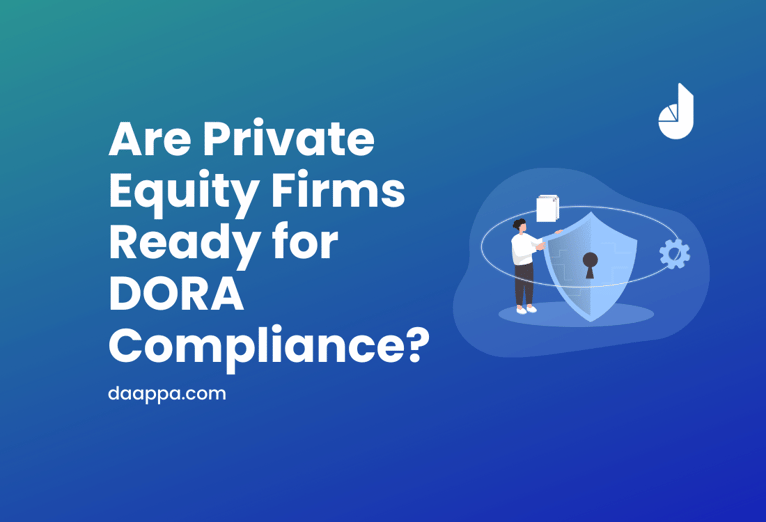How PE Fund Accounting Software Transforms Private Equity Management
In today’s competitive private equity (PE) landscape, precision and performance are inseparable. Fund managers are under mounting pressure to deliver transparency, maintain...


In the private equity sector, the importance of vendor due diligence has often been overlooked, leading to increased operational risks and compliance challenges. The upcoming Digital Operational Resilience Act (DORA) aims to address these issues by mandating stricter vendor management practices. Here’s how private equity firms can prepare for DORA and enhance their vendor due diligence processes, and how daappa is leading the way in compliance and operational resilience.
DORA requires private equity firms to perform comprehensive risk assessments of their vendors. This involves evaluating the potential risks associated with each vendor's services and ensuring that they have robust risk management frameworks in place. For example, a major private equity firm faced significant financial losses when a vendor's security breach compromised sensitive investor data. Under DORA, firms will need to conduct regular risk assessments to prevent such incidents and mitigate potential impacts on their operations.
At daappa, we take vendor risk management seriously. We are ISO accredited, demonstrating our commitment to high standards of information security management. This accreditation ensures that we have implemented best practices for risk management and data protection, providing our clients with confidence in our robust security measures.
Private equity firms must ensure that their vendors comply with applicable regulatory standards. This includes verifying that vendors have the necessary controls and procedures to meet DORA compliance requirements. In a notable case, a firm experienced regulatory scrutiny when it was discovered that a key vendor failed to adhere to anti-money laundering (AML) regulations. With DORA, private equity firms will be held accountable for their vendors' compliance, necessitating rigorous due diligence processes.
We develop all our solutions in-house, avoiding the risks associated with outsourced development. By maintaining complete control over our development processes, we ensure that our products meet the highest standards of quality and compliance. Our due diligence on suppliers is thorough, providing our clients with the comfort that our partners also adhere to stringent regulatory and operational standards.
Strengthening vendor oversight is crucial for maintaining operational resilience. DORA emphasises the importance of ensuring that vendors can continue to deliver services during disruptions. For instance, during the COVID-19 pandemic, many firms faced operational challenges due to inadequate vendor continuity plans. By implementing DORA compliance requirements, private equity firms can ensure that their vendors have robust business continuity and disaster recovery plans, enhancing their overall resilience.
Our commitment to operational resilience is reflected in our ISO and CSR accreditations. These certifications demonstrate our adherence to the highest standards of operational and corporate social responsibility, ensuring that we are well-prepared to handle disruptions and maintain continuous service delivery for our clients.
Meeting DORA's stringent vendor management requirements will help private equity firms avoid regulatory penalties and reputational damage. Regulatory bodies have increasingly scrutinised firms for insufficient vendor oversight. A case in point is when a firm was fined for not adequately monitoring a vendor's data protection practices, resulting in a significant data breach. DORA will compel firms to conduct detailed due diligence, including periodic audits and continuous monitoring of vendors, ensuring compliance and safeguarding their reputation.
We are committed to ongoing compliance and continuous improvement. Our in-house development and rigorous supplier due diligence ensure that all our solutions and partnerships comply with regulatory standards. This proactive approach helps our clients meet DORA compliance requirements and maintain a strong compliance posture.
Effective vendor due diligence fosters stronger, more reliable partnerships. By thoroughly vetting vendors, private equity firms can select partners that align with their strategic goals and compliance requirements. For example, a firm that conducted extensive due diligence before partnering with a financial technology provider was able to leverage advanced analytics and improve operational efficiency, leading to better investment outcomes. DORA will encourage firms to build more strategic and resilient vendor relationships.
Our comprehensive approach to vendor due diligence not only ensures compliance but also strengthens our partnerships. By maintaining high standards and rigorous oversight, we build trust and reliability with our clients, helping them achieve their strategic objectives.
Private equity firms should start by conducting detailed assessments of their current vendors. This involves evaluating their risk management frameworks, compliance with regulatory standards, and operational resilience capabilities. Firms should develop a risk-based approach to categorise vendors based on their criticality and potential impact on operations.
Firms need to establish robust due diligence processes to evaluate new vendors and continuously monitor existing ones. This includes conducting regular audits, reviewing compliance documentation, and assessing vendors' business continuity plans. Firms should also consider leveraging technology solutions to streamline due diligence processes and ensure thorough assessments.
To ensure compliance with DORA regulatory technical standards, firms should review and strengthen their vendor contracts. Contracts should include specific clauses related to regulatory compliance, risk management, and business continuity. Firms should also establish clear reporting and communication protocols with vendors to ensure timely updates on any changes or incidents that may impact their operations.
Private equity firms should invest in enhancing their internal capabilities to manage vendor relationships effectively. This includes training staff on DORA requirements, developing comprehensive vendor management policies, and implementing technology solutions for continuous monitoring and reporting. Firms should also establish a dedicated vendor management team to oversee due diligence processes and ensure compliance.
Implementing technology solutions for continuous monitoring of vendor performance and compliance is crucial. Firms can use advanced analytics and automation tools to identify potential risks and ensure vendors adhere to regulatory standards. Continuous monitoring enables firms to proactively address issues and maintain operational resilience.
The Digital Operational Resilience Act (DORA) is set to transform vendor management practices in the private equity sector. By enhancing vendor due diligence, private equity firms can mitigate risks, ensure compliance, and build stronger, more resilient partnerships. Preparing for DORA compliance involves conducting comprehensive vendor assessments, implementing robust due diligence processes, strengthening vendor contracts, enhancing internal capabilities, and leveraging technology for continuous monitoring.
At daappa, we are committed to leading the way in vendor due diligence and compliance. Our ISO and CSR accreditations, in-house development, and rigorous supplier due diligence provide our clients with confidence in our solutions and partnerships. Embracing these practices will not only ensure regulatory compliance but also drive operational excellence and strategic success in the competitive private equity landscape.

In today’s competitive private equity (PE) landscape, precision and performance are inseparable. Fund managers are under mounting pressure to deliver transparency, maintain...
.png)
Amid rising operating costs and a shortage of experienced talent in Europe’s financial services sector, daappa Ltd and OneNexus Outsourcing Services LLP announce a strategic...

With the introduction of CSSF Circular 24/856 on 1 January 2025, private market fund managers operating in Luxembourg face stricter oversight on NAV calculation errors, investment...